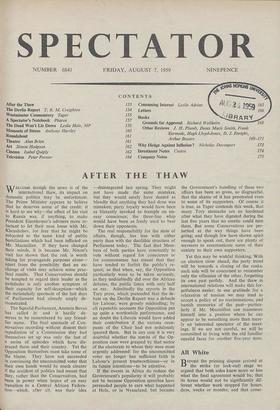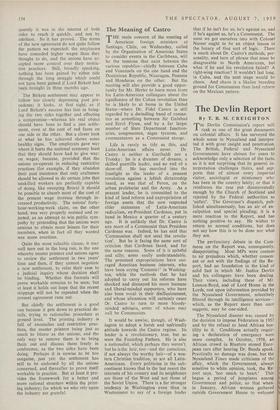All White
BEFORE the printing dispute arrived at the strike (or lock-out) stage we argued that both sides knew more or less what the final agreement would be; that its terms would not be significantly dif- ferent whether work stopped for hours, days, weeks or months; and that conse-
quently it was in the interest of both sides to reach it quickly, and not by attrition. So it has proved. The terms of the new agreement do not quite follow the pattern we expected: the employers have conceded higher wages than they thought to do, and the unions have ac- cepted more control over their restric- tive practices. Still, broadly speaking, nothing has been gained by either side through the long struggle which could not have been gained if Lord Birkett had been brought in three months ago.
The Birkett settlement may appear to follow too closely depressing past pre- cedents; it looks, at first sight, as if Lord Birkett's success has lain in bring- ing the two sides together and effecting a compromise—whereas his real object should have been to find a just settle- ment, even at the cost of red faces on one side or the other. But a closer look at what he has achieved shows some healthy signs. The employers gave way where it hurts the national economy least that they should have had to give way: on wages; because, provided that the unions co-operate in reducing restrictive practices (for example, if they abandon their past insistence that only craftsmen should be allowed to do certain jobs that unskilled workers are perfectly capable of doing, like sweeping floors) it should be possible to absorb most of the cost of the present wage increase through in- creased productivity. The unions' forty- hour-working-week claim, on the other hand, was very properly resisted and re- jected, as an attempt to win public sym- pathy by pretending that the unions were anxious to obtain more leisure for their members, when in fact all they wanted was more overtime.
Quite the most valuable clause, it may well turn out in the long run, is the one whereby master printers and unions agree to review the settlement in two years' time and then, if they cannot negotiate a new settlement, to refer their case to a judicial inquiry whose decision shall be binding. Whether this formula will prove workable remains to be seen; but at least it holds out hope that the recent stoppage will not be repeated when the present agreement runs out.
But chiefly the settlement is a good one because it gets down to practical de- tails, trying to rationalise procedure at ground level. The printing industry is full of anomalies and restrictive prac- tices, the master printers being just as much to blame as the unions; and the only way to remove them is to bring them out and discuss them freely in conference, as the two sides have been doing. Perhaps it is unwise to be too sanguine, just yet: the settlement has still to be endorsed by all the unions concerned, and thereafter to prove itself workable in practice. But at least it pro- vides the framework for a better and more rational structure within the print- ing industry; for which we who rely upon the industry are grateful.



























